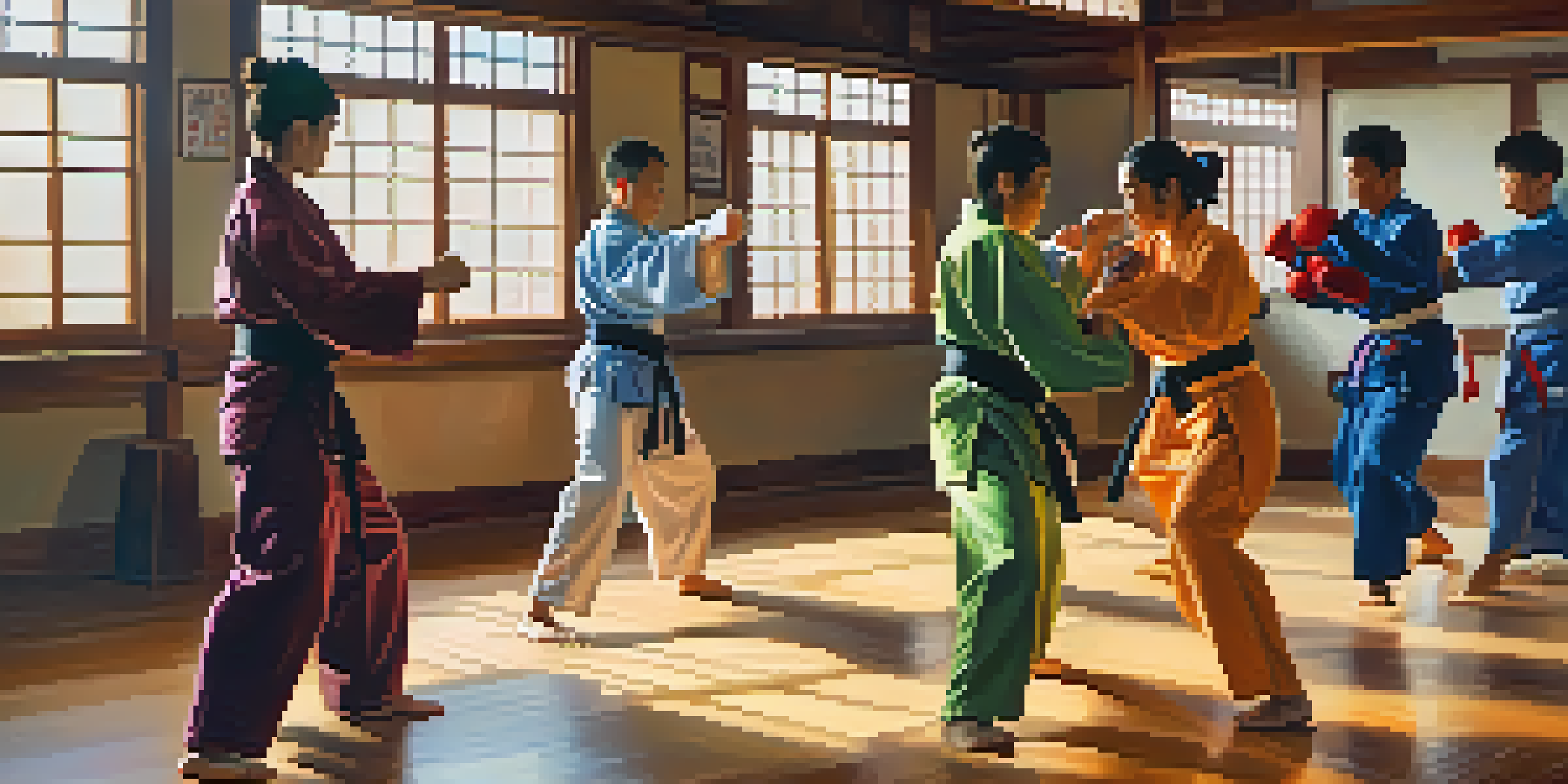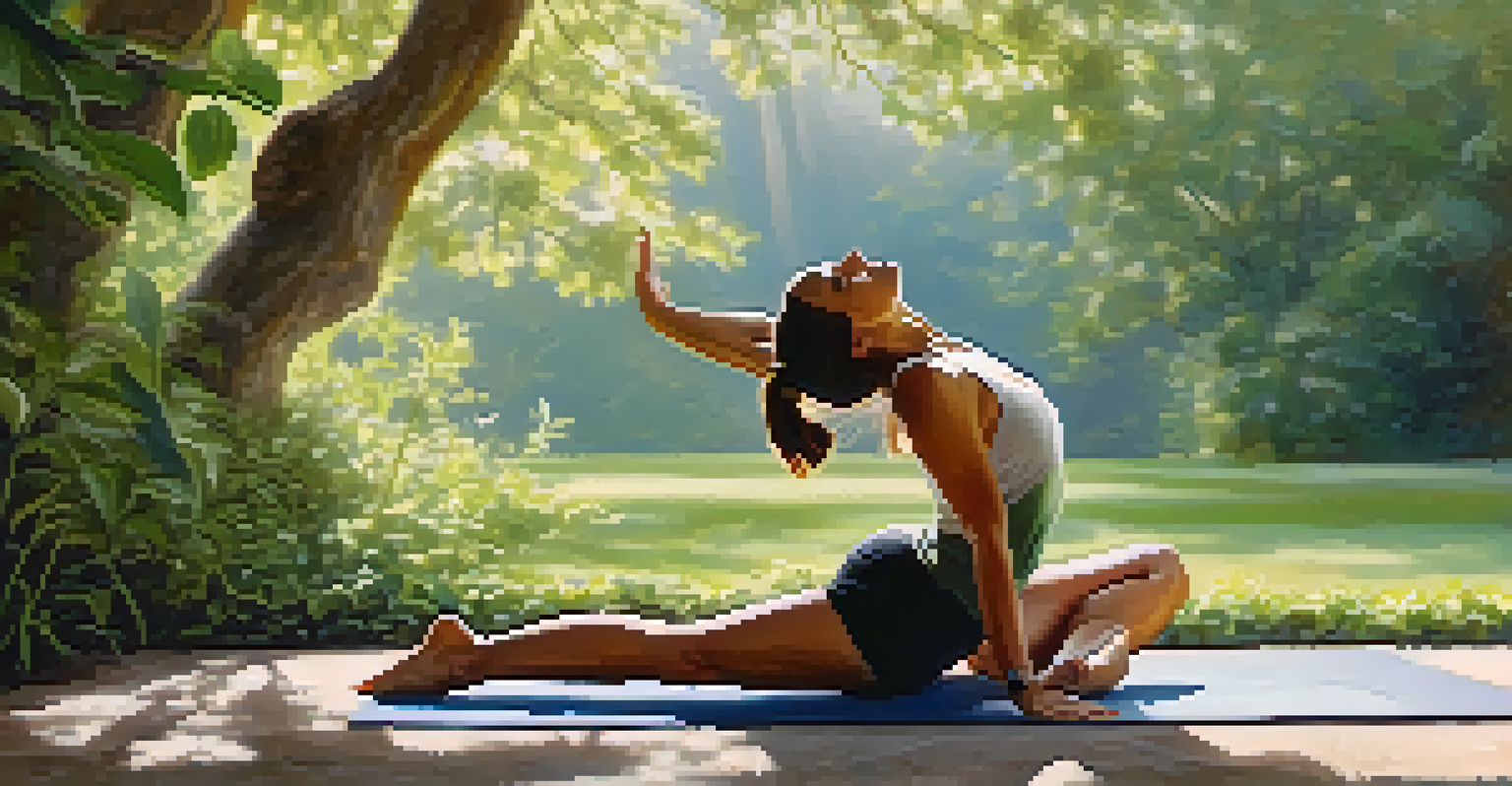The Role of Martial Arts in Adult Physical Literacy Development

Understanding Physical Literacy in Adults
Physical literacy is the ability to move with competence and confidence in a variety of physical activities. For adults, this means not just being able to perform a sport, but also engaging in everyday movements like walking, climbing stairs, or playing with children. It encompasses a range of skills, from balance and coordination to endurance and strength.
Physical fitness is not only one of the most important keys to a healthy body, it is the basis of dynamic and creative intellectual activity.
As we age, maintaining our physical literacy becomes increasingly important for overall health and well-being. This is where martial arts can play a crucial role, offering structured environments to improve these skills in a fun and engaging way. By participating in martial arts, adults can not only enhance their physical abilities but also boost their confidence in movement.
Ultimately, physical literacy allows adults to lead more active lives, reducing the risk of injury and promoting lifelong fitness. With martial arts, practitioners learn effective techniques and gain the physical literacy needed to navigate various physical challenges safely.
Martial Arts as a Pathway to Enhanced Coordination
One of the primary benefits of martial arts training is the improvement of coordination. Through repetitive movements and practice, martial arts help individuals develop better control over their bodies. This increased coordination can translate to everyday activities, making tasks like driving or even typing easier.

Consider a beginner in karate who struggles with basic punches and kicks. As they practice, they gradually learn to synchronize their movements, leading to improved coordination. This not only boosts their martial arts performance but also enhances their overall physical literacy.
Martial Arts Boosts Physical Literacy
Engaging in martial arts enhances adults' physical literacy by improving their coordination, strength, endurance, and flexibility.
Moreover, improved coordination can help prevent falls and injuries, particularly in older adults. By developing these skills through martial arts, practitioners become more agile and adept at navigating their environment, fostering a sense of safety and independence.
Building Strength and Endurance Through Martial Arts
Martial arts training is a dynamic way to build strength and endurance, two key components of physical literacy. Each class typically involves a mix of cardio, strength training, and flexibility exercises that engage multiple muscle groups. This holistic approach helps adults become stronger and more resilient in their daily activities.
The greatest wealth is health.
For example, practicing techniques like kicks and punches requires core strength, balance, and stamina. Over time, participants notice improvements in their overall fitness levels, which can motivate them to stay active outside the dojo. This increased strength and endurance not only enhances performance in martial arts but also in other physical activities.
Additionally, as adults engage in regular training, they may find it easier to perform tasks like lifting groceries or playing sports with friends. The confidence gained from improved strength can encourage a more active lifestyle, contributing to better health outcomes.
Flexibility: A Key Benefit of Martial Arts Training
Flexibility is often overlooked in discussions about physical fitness, yet it plays a vital role in overall physical literacy. Many martial arts incorporate stretching routines that help increase flexibility, allowing practitioners to move more freely and efficiently. This improved range of motion can enhance performance in both martial arts and everyday activities.
Imagine a jiu-jitsu practitioner who regularly practices their stretches. Over time, they notice they can easily bend down to tie their shoes or reach for items on a high shelf. This newfound flexibility not only aids in martial arts but also reduces the risk of injury in daily life.
Mental Resilience Through Training
Martial arts fosters mental resilience, helping individuals build focus and determination that benefits various aspects of their lives.
Furthermore, flexibility training can help alleviate muscle tension and promote relaxation. As adults become more flexible, they may experience less discomfort during physical activities, making it easier to stay active and engaged.
Mental Resilience: The Psychological Benefits of Martial Arts
Beyond physical benefits, martial arts also foster mental resilience, a crucial aspect of overall physical literacy. The discipline required to master martial arts techniques helps individuals build focus and determination. This mental strength translates to other areas of life, enabling adults to tackle challenges with confidence.
For instance, consider a student preparing for a martial arts belt test. The dedication and perseverance required to pass can boost their self-esteem and prepare them for challenges outside the dojo, whether in their careers or personal lives. This psychological growth is a significant aspect of developing physical literacy.
Moreover, martial arts often emphasize principles like respect and patience, which can enhance emotional intelligence. As adults learn to manage their emotions through practice, they develop greater resilience, allowing them to navigate life’s ups and downs more effectively.
Social Connections Through Martial Arts Participation
Joining a martial arts class can also help adults build social connections, which is an essential aspect of overall well-being. Training with others fosters a sense of community and belonging, making it easier to stay committed to fitness goals. These social interactions can be particularly beneficial for those who may feel isolated or disconnected.
Picture a group of adults training together in a taekwondo class. As they spar and share tips, they form friendships that extend beyond the dojo. This camaraderie not only makes training more enjoyable but also encourages participants to support each other in their fitness journeys.
Community and Social Connections
Participating in martial arts creates a sense of community, allowing adults to form social connections that enhance their commitment to fitness.
Additionally, the supportive atmosphere of martial arts classes can help boost motivation and accountability. When individuals feel connected to their peers, they are more likely to stick with their training, leading to long-term improvements in their physical literacy.
Setting Goals and Measuring Progress in Martial Arts
Martial arts training offers a unique framework for setting and achieving personal goals, which is vital for physical literacy development. Many martial arts schools utilize a belt system that encourages practitioners to work towards specific milestones. This structured approach helps adults stay motivated and focused on their fitness journeys.
For example, a student aiming for their next belt level must train consistently, mastering various techniques and skills along the way. This goal-oriented training not only promotes physical growth but also fosters a sense of accomplishment that can be applied to other areas of life.

Moreover, measuring progress in martial arts can enhance self-awareness and encourage lifelong learning. As adults reflect on their journey, they become more attuned to their physical abilities and limitations, empowering them to pursue further growth in their physical literacy.
Conclusion: Embracing Martial Arts for Lifelong Physical Literacy
In conclusion, martial arts serve as an excellent avenue for enhancing adult physical literacy. By improving coordination, strength, endurance, flexibility, and mental resilience, martial arts can help individuals lead healthier and more active lives. The social connections formed during training further enrich the experience, making it both rewarding and enjoyable.
As adults engage in martial arts, they develop a deeper understanding of their physical capabilities, fostering a lifelong commitment to fitness. Whether you’re a beginner or a seasoned practitioner, the benefits of martial arts extend far beyond the dojo.
So, if you’re looking to enhance your physical literacy and embrace a more active lifestyle, consider stepping onto the mat. The journey of martial arts awaits, offering countless opportunities for growth, connection, and well-being.